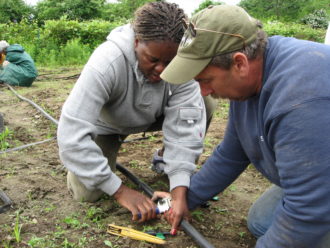Lydia Sisson had worked on farms before, but when it came to taking the next step—going into business for herself—she hesitated, unsure of how to navigate the complexities of acquiring land, keeping the books, analyzing the market and more. But after taking a business training course through the New Entry Sustainable Farming Project in early 2008 and drawing up a detailed business plan, she felt ready to try, and today, with demand for her produce growing, she is glad she did.
In her first year as an independent farmer on five acres in North Reading, Mass., Sisson has made about $36,000 in sales through a 50-member community supported agriculture (CSA) program and a local co-op. And there is room for growth: Next year, she expects to expand her CSA to 75 members, begin selling at farmers’ markets and even hire temporary workers.
“If it wasn’t for writing that business plan, I probably wouldn’t have felt confident in starting this,” says Sisson, who grows a wide variety of produce using organic and sustainable methods.
Hundreds of beginning and limited-resource farmers in northeastern Massachusetts like Sisson have received assistance from New Entry, a Tufts University program started in 1998 and recipient of three SARE grants. While it originally served as a resource for the Lowell area’s large immigrant population, New Entry has expanded to provide equal support to U.S.-born farmers like Sisson, and has become a regional leader among organizations assisting beginning and immigrant farmers.
SARE's Continuing Support
Interested in offering more livestock and poultry programming, New Entry received a 2009 SARE grant to teach farmers how to use mobile poultry processing units (MPPUs), and navigate the regulatory and food safety issues associated with them. Three farms using MPPUs in a pilot program are expected to exceed $51,000 in total revenue. "There's a huge market for this, and it presents an opportunity to diversify from vegetables," says New Entry Director Jennifer Hashley.
Most of the people New Entry helps have a farming background but know little about running a farm in the United States. New Entry’s offerings include the six-week business course, regular technical workshops, a three-year, on-farm training program where participants pay New Entry for land, equipment and materials, and a transitioning program aimed at moving farmers to independence.
The transitioning program, launched in 2005 with funding from SARE and other sources, has helped a dozen farmers start small-acreage operations to supplement off-farm incomes, generally earning them between $5,000 and $10,000 per year.
The program helps with all aspects of starting a farm business: finding land and negotiating contracts, getting equipment, managing a farm, acquiring loans and insurance, and more. “It’s a little more big picture, sitting down with a farmer and really planning their next move,” says New Entry Director Jennifer Hashley.
Seona Ban, a transitioning program graduate, is now farming on 1.5 acres and helping to support family members through fresh produce and extra income. Along with business advice, New Entry helped Ban adjust to the growing conditions in Massachusetts, which are far different in her native Cameroon.
“They helped with a lot of things, like how to do irrigation. That was something we never do back in Cameroon, where it’s always raining,” Ban says.
